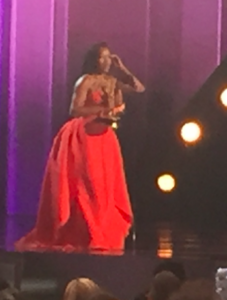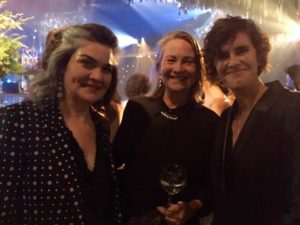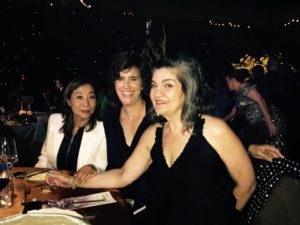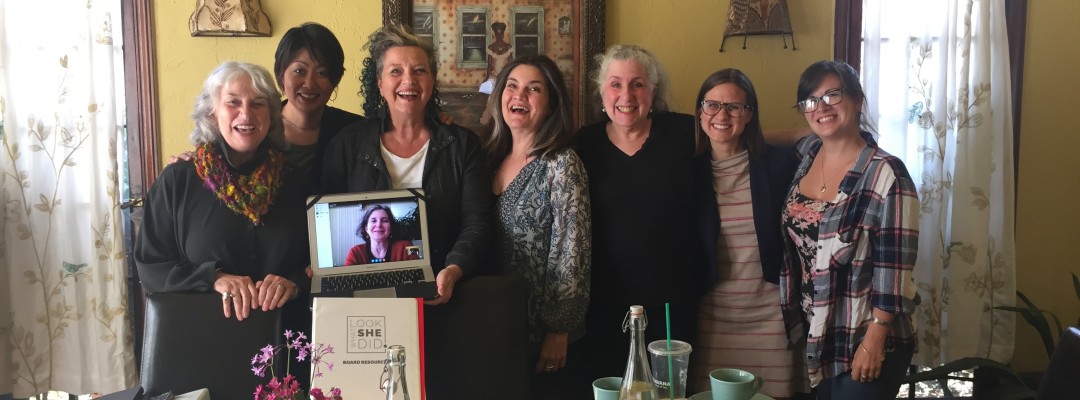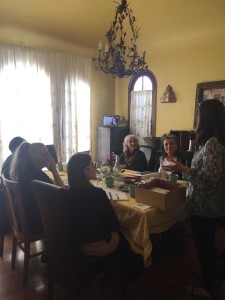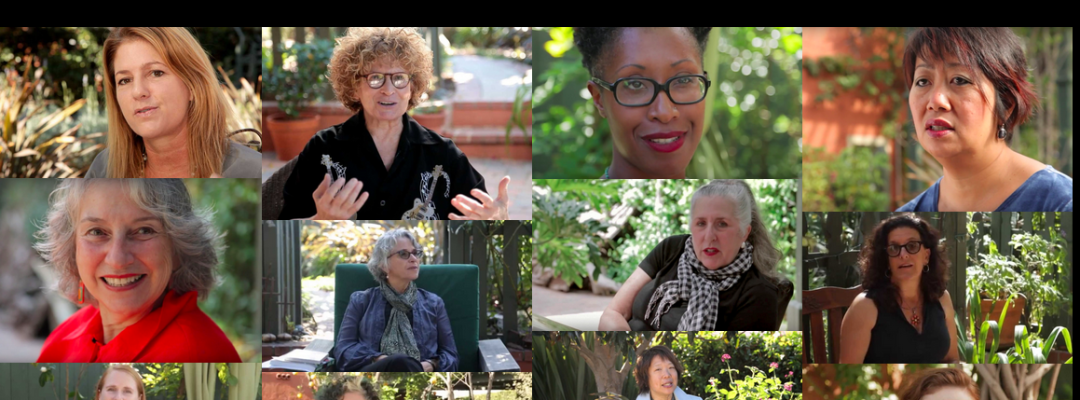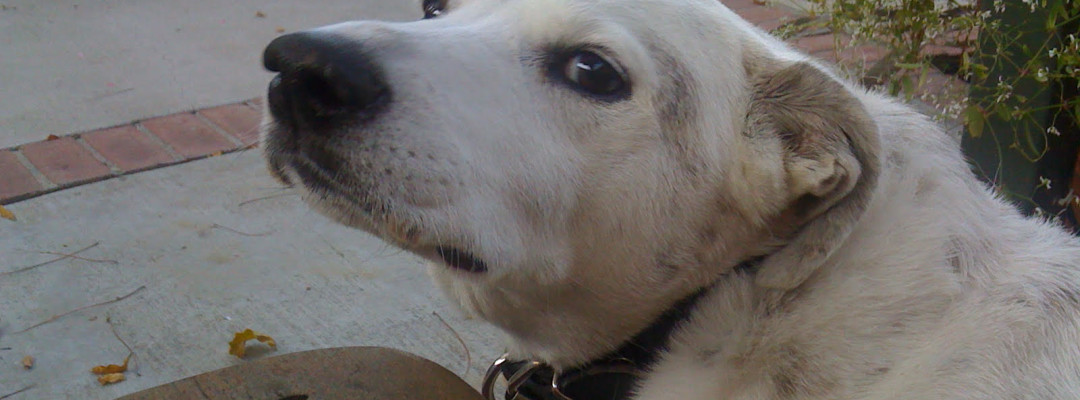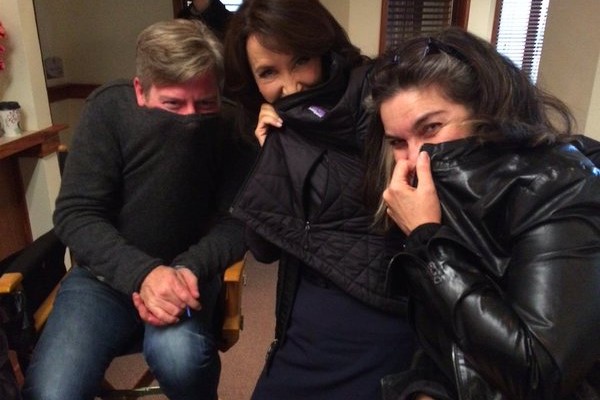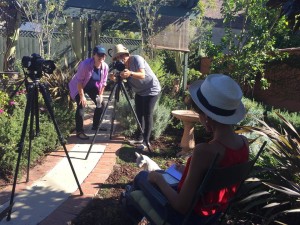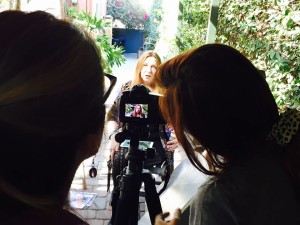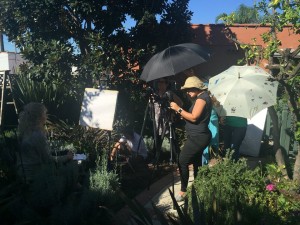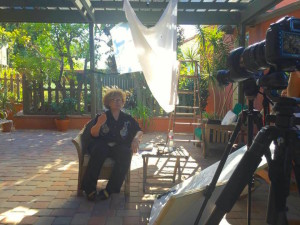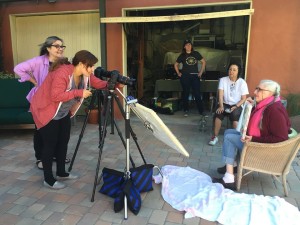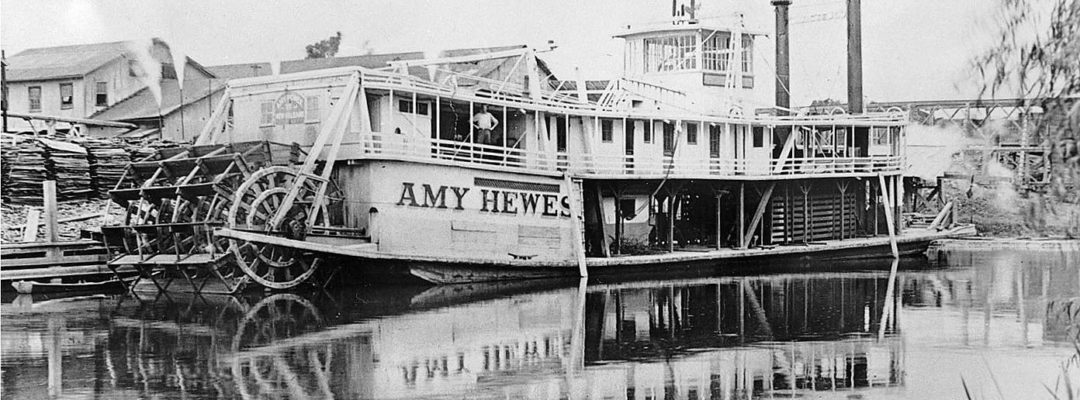
Naked in the River
ODILE AUCOIN and Jean-Francois LeBlanc took a steamboat down Bayou Teche in 1923 to the river town of Cours D’eau, Louisiana, to make their fortune together, exchanging a hardscrabble rural life for opportunities only a boomtown could offer.
He had a third-grade education, she’d made it through seventh. She carried a carefully folded spelling certificate congratulating her on a perfect score, in case it might help her get a job. They’d been married in the parish clerk’s office in St. Martinville before eloping on the steamboat Amy Hewes (with a dancehall onboard), planning a church wedding once they’d settled and started making money. Odile was dark-haired, wide-faced, pretty in her way, with lively eyes that didn’t miss a thing. Jean-Francois was five-foot-eleven, broad-shouldered, good-looking, and genial. He always had a harmonica in his pocket and was a world-class whistler. Odile was the willful one. She had plans. She was nineteen. Jean Francois had just turned twenty-six. They spoke nuanced French with each other, broken English to the outside world.
Odile took a job at a seafood warehouse on Front Street down by the river, picking crabs for ten cents a pound, leaving her fingers bloody from the sharp shells and swollen from the wetness. She worked faster than most to make enough to enroll in an English grammar class once a week at the Marcel School for adults, intent on getting her high school diploma. Jean-Francois worked at the shell crusher, hauling fifty-pound bags of pulverized oyster shells used for covering roads and parking lots, a modern improvement over dirt paths, which turned to muddy ruts in the Louisiana rain. The heavy work didn’t bother Jean-Francois, who had been working hard for as long as he could remember. His mother died in childbirth when he was two years old, and his father remarried soon after. Jean-Francois was the oldest of a brood of half brothers and sisters he helped raise. He could cook, quiet a baby, work a cane field or build anything you wanted, whistling all the while. Work didn’t bother Jean-Francois, it was expected, he did it without complaint; it was the evenings he looked forward to.
Jean-Francois liked to drink. It was Prohibition times, but that meant almost nothing in south Louisiana. New Orleans was dubbed the “liquor capital of America,” but the small towns along the coast were even more soaked in alcohol. Who was going to enforce the Noble Cause? No one. Many a fortune was made running rum and bootleg whiskey through the web of bayous and backwaters filtering to the Gulf of Mexico. There was so much more liquor in south Louisiana after Prohibition, the price of a drink went down. Which was fine with Jean-Francois.
Odile and Jean-Francois rented a shotgun house on a bend of River Road between the railroad tracks and the graveyard. Every room was tiny, the whole house was the size of one good-sized room, but it was a miracle to them, having both grown up with a horde of siblings, sharing beds, sharing clothes, sharing everything. This was theirs and theirs alone—front room, kitchen, bedroom, screened washing porch with wooden steps leading to a scraggly back yard with an outhouse. Odile had plans for that yard, a vegetable garden to feed them through hard times.
The view from their back door was of the old cemetery, which had graves going back before the Civil War, even though the town was less than twenty years old. Jean-Francois liked to sit on the back steps with his black coffee before work, watching the rising sun throw shadows on the tombstones. The cemetery was here first, he thought, and it’ll outlast the town. He imagined himself and Odile lying in the dirt there, side by side through eternity.
One warm Friday night in November Jean-Francois gets hold of a gallon of gin and invites his buddy Clayton from the shell crusher over to drink it with him and Odile. Clayton, tall and skinny, is from north Louisiana, having recently moved to Cours D’eau, like so many others, looking for a life beyond the farm.
After knocking off, the guys stop at the ice house to buy a chunk of ice, then hump it fast to River Road to get started on the gin before the ice melts. It’s already dark with a rising three-quarter moon as they hurry along the shortcut through the old graveyard when Jean-Francois shouts, “Fais nous?” stopping to suck the dripping ice and take a quick swig of gin. Clayton laughs and does the same as Jean-Francois flops onto the wide flat tombstone of the Morgan family. He notes they’re in the rich Protestant section, French Catholics only allowed at night or if they’re digging graves.
Clayton wants to know, “Where the poor people at?”
Jean-Francois points to a side area under a cluster of oak trees.
“Least we’re better off than the coloreds, who barely get headstones. But the Jews—look—they got a little iron fence around them. Like they wanna be apart from everybody.”
Clayton starts to urinate on the graves of the wealthy, but Jean Francois stops him. “Why piss off God?”—making a play on the word piss that flies right over Clayton’s head.
When they get to the house, Odile is playing cards at the kitchen table with a new acquaintance, Susan Ann Price. Both girls squeal when they see the gin. Odile takes the dripping ice, discreetly pressing her puffy, reddened fingers onto the frozen chunk for relief.
Odile introduces Susan Ann as her English teacher from the Marcel School. Jean-Francois teases his wife—in French—she’s always trying to move up in the world with fancy friends, but he likes her like she is. He cups her ass, tugging her in for a kiss and a playful bite on her nose. Without letting go of his bride he switches to English, “Nice to meet you, Susan Ann. This my buddy Clayton.”
Clayton mumbles hello, digging his boot at a tear in the grungy flowered linoleum, stealing looks at Susan Ann’s ample curves. She takes the measure of long, tall Clayton, likes what she sees, straightens her back a little to show off her bosom.
With a worn wood-handled ice pick, Odile chips ice into mismatched jelly jars and Jean-Francois pours the gin. The ancient window fan rattles away, not giving much of a breeze on this hot night.
Three drinks later Clayton is sitting in his underwear, the two women are down to their rayon slips, bras, and panties, and Jean Francois is removing his shirt, having just lost a hand of strip poker on purpose so as not to be the only one at the table still dressed. The gin is only half gone.
Whistling, Jean-Francois deals another hand but Clayton looks scared—he doesn’t have a lot left to bet—and Susan Ann nervously asks if her purse counts as something she can wager?
Clayton pushes the cards away. “Maybe I better . . .”
But Odile is not ready for the night to be over.
“It’s too hot in here. This old fan don’t cool off much. Let’s go outside.”
Susan Ann doesn’t want Clayton to leave but – “Not like this!” She covers her chest with her hands.
Odile stands, stretching in front of the fan, arms lifted, eyes closed, pale-pink slip sticky with sweat at her midriff. Jean Francois strokes her hip. Clayton tries not to look. Odile opens her eyes, reassures Susan Ann, “We know a place.”
It’s quiet on the slow-moving river, the waxing moon casting shadows through the willows clustered on the muddy banks at the bend where a pirogue lays hidden in high grass a few feet from a small rough-hewn dock. Whispering cuts the humid night air as the couples cross the railroad tracks, loping down the embankment, headed for the water. Odile leads the way, Jean Francois carries the gin, chasing her.
Having redressed for the trip across the road, Odile pulls her dress over her head and flings it in Jean-Francois’s direction. She darts away, stripping as she goes, taunting Jean-Francois, who makes no real effort to catch her, preferring to see her running naked in moonlight.
Clayton and Susan Ann bring up the rear, learning the rules of this wild night as they go—he pretends to chase her, she escapes with a laugh.
Once Odile reaches the dock she shimmies up the four-foot post at the end, posing nude, high above the river, waiting for the others. Having shed her poor-girl rags, she is restored to the riches of her healthy nineteen-year old body—firm breasts, flat stomach, strong legs, a shield of beauty connecting her to goddesses of old. She howls.
Jean-Francois lunges to silence her—she dives into the river.
He shrugs off his clothes, slugs back the gin, and follows her into the black water.
Susan Ann and Clayton arrive at the dock, panting. He grabs her by the waist, kisses her. She pulls away, he holds on. Listening to the thrashing lovers in the water, tapping desire she didn’t know she had, Susan Ann Price unbuttons her dress—for the second time that night. Never taking his eyes off her, Clayton gets out of his clothes. Susan Ann’s breasts are fuller than Odile’s, and when she removes her bra the release takes Clayton’s breath. He reaches for her, but she flits away to the end of the dock. Nowhere to go but into the dark muddy river . . . Susan Ann hesitates.
“How deep is it?”
“ ‘Chafalaya’s pretty deep, ya know, the paddleboat’s come through. We only thirteen miles to the Gulf.”
“But I mean right here. Will I touch bottom? Will it be muddy?”
“Let’s find out.” He eases her toward the water.
“No, don’t! I don’t want to.”
“Okay. It’s okay, ya know, whatever you want.”
Something grabs Susan Ann’s ankle—she screams and lurches into Clayton’s arms. Jean-Francois pops up in the water. “Jump in, mes amis. What you waitin’ for?”
Susan Ann tries to regain herself. “You scared the devil out of me!”
Odile swims over, hangs on Jean-Francois’s neck. “Feels good, ya’ll—c’mon.”
“It’s okay, Susan Ann. It’s just fun.” Clayton runs a finger along her face, tucking a stray lock of hair behind her ear, a gesture somehow more intimate than all the nudity of the evening. It’s too much.
Susan Ann, suddenly sober, sees herself like her mother and father would, like her pastor would—naked, outside, cavorting with low-class strangers by a dirty river. Shocked at herself and deeply ashamed, she pulls away from Clayton, covering her body with her hands as best she can. “I need to go.”
“I dare you!”
Odile pushes herself up on Jean-Francois’ shoulders, shouting into the night, “I dare you, Susan Ann Price!”
Susan Ann so wants to be that girl—daring, free, divinely sensual. She’s twenty-two years old and senses she will never be more beautiful or more desired than she is at this moment. Clayton reaches a hand to her—Susan Ann takes it—he yanks her into his arms, leaping out over the water, yowling. Odile and Jean Francois whoop in celebration as the water around them explodes.
They swim and tease and talk as the moon crosses the inky sky. When they hear a car on River Road, they float to the cover of the willow trees, but when the 11:18 Southern Pacific rumbles through on the nearby railroad tracks they hoot and holler, and the women bob up to flash their breasts. Jean-Francois passes the bottle as they tread water, finishing the warm gin as the church bell tolls the midnight hour. Twelve peals.
They dress without looking at one another. Clayton asks if he can escort Susan Ann home, but she has missed the last ferry to Morgan City. Odile invites her to spend the night in their front room.
Back at the house Odile makes up a pallet of quilts for Susan Ann, suggesting the coolest place to sleep is under the window fan in the kitchen, but if she prefers the front room, that’s fine. Clayton keeps trying to say goodnight but never quite makes it out the door.
Jean-Francois and Odile say they always sit on the back steps for a while before going to bed, a white lie to give the new lovers privacy. Clayton shoots Jean-Francois a grateful look; Susan Ann’s eyelids flutter as she stares at the floor.
Odile and Jean-Francois find crackers and a tin of Vienna sausages and disappear out the back door, leaving Susan Ann and Clayton alone in the house.
Odile sits one step below Jean-Francois, leaning into him, feeding him, kissing him upside down with Vienna sausage breath. As their eyes accustom to the dark, shapes appear in the shadowy graveyard—mossy trees, tombs, crucifixes, sorrowful angels. The smell of rain is in the air. They whisper in French. After she gets her high school diploma from the Marcel School she’ll get a fancy job—maybe in an office. He likes that idea, she can support him in style. Meanwhile, he heard he can make more money as a cook on a tugboat, but it’ll mean being away from her.
Staring at the graveyard Odile tells him, “Sacrifier maintenant pour l’avenir.” Sacrifice now for the future. She wants to get married in the Church, she wants to have lots of babies. But first they have to save—and learn to speak good English.
“Parle l’anglais,” she insists.
He indulges her, as always. “I’m a build us a house. Red house.”
“Wit’ a porch. An’ a vegetable garden.”
“Et le chat.”
“What we need a car for?”
“A car—wit’ a radio. For drivin’ an’ singin’. I’m a build a playhouse pour les enfants an’ a work shed pour moi. What you want, for your special room?”
“Sewing room.”
“All right then, c’est bon, ma chere, c’est bon.”
“But first we got to sacrifice.”
It starts to rain, lightly, a drizzle. Odile stands, tilting her head back, opening her mouth to the heavens. Jean-Francois grabs his spirited girl and they sneak silently back into their tiny rented house and their rickety borrowed bed, making love quietly with the smell of river in her hair.
In the morning Susan Ann and Clayton are gone, the quilts from the pallet neatly folded. That afternoon Odile and Jean Francois break ground on their backyard vegetable garden.
At Sunday Mass Alida Jumonville snubs Odile, not responding to her greeting, walking away as if she hasn’t seen her.
On Monday at work none of the girls talk to Odile. They barely look at her except to sneak sly glances and catch each other’s eyes with knowing looks. Odile corners her friend Marie.
“What’s going on, anh? How come nobody’s talking to me?”
Marie, a skinny, nervous girl, pretends not to know but has a frantic look as if she’s scared to be seen with Odile, as if she might catch something from her.
Over an early supper Odile tries to figure it out with Jean Francois, who laughs it off. “Women always carrying on. Ignore it, it’ll go away.”
But when she shows up for her class that night at the Marcel School she is told by the principal she is no longer a student there. They do not allow loose women into their classes. Odile protests, outraged. “What you talkin’ about? I’m a good Catholic, from a good family!”
The principal raises his eyebrows. “I understand you are living in sin, hosting single men in your rent house on River Road. You’re a bad influence on our students, and you are no longer welcome here.”
He attempts to shut the door, but Odile sticks her foot in it.
“That’s a lie! Who says that?”
“Did you swim naked in the river with two men? Did two men spend the night with you after that? Is that a lie?”
Behind him Odile sees Susan Ann peeking out of her classroom, too curious to stay hidden. Under Susan Ann’s glare of defiance Odile sees fear—fear Odile will fight back, expose the truth of their sweet, wild night, smear Susan Ann’s reputation, stain her virginity, ruin her chances.
Odile smells linseed oil rising from the polished oak floor, the cleanest floor she’s ever seen. She loves walking to her class, the click of her shoes echoing in the wide hall like she’s going somewhere.
Odile realizes—who would believe me?—a barely literate Cajun girl not married in the Church over upstanding Susan Ann Price of Morgan City?
She says, “Susan Ann . . .” beginning an appeal.
Susan Ann shakes her head, one sharp move, and she’s gone. The principal pulls the school door shut, leaving Odile on the steps outside, burning with shame.
Susan Ann will leave this job to teach elementary school on the good side of the river, away from the rough trade of boomtown Cours D’eau. Alone in her bed at night she will revisit, time and again, Clayton’s body clasping her, skin on skin, flying through the air, splashing into the cold dark wet.
Odile walks home in twilight, breathing in muddy river air, eyes wandering downstream with the currents past oaks and willows, winding to the Gulf. In the far reaches of her soul the extinction of her dream makes room for reality. But time enough for that. Tonight she sorrows.

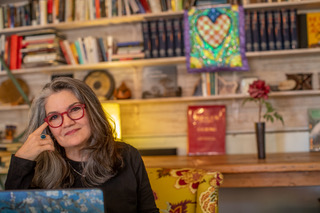
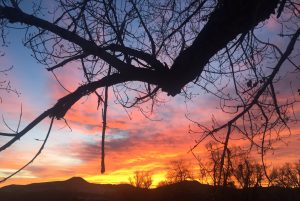

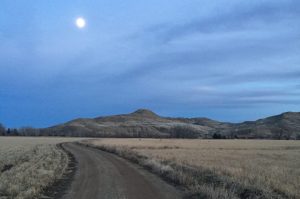 All said, it was the most productive time I’ve had as a writer in many years and I could not be more grateful to Ucross and to Mame Hunt and Roberta Levitow for introducing me there. BTW— I’m now working at home at my new standing desk! Fingers crossed to keep the productivity going…
All said, it was the most productive time I’ve had as a writer in many years and I could not be more grateful to Ucross and to Mame Hunt and Roberta Levitow for introducing me there. BTW— I’m now working at home at my new standing desk! Fingers crossed to keep the productivity going…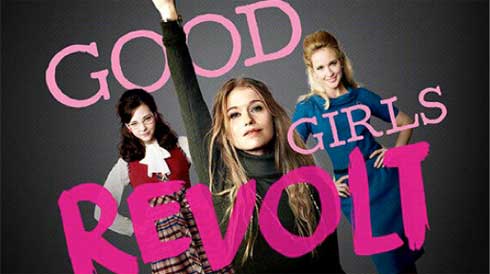
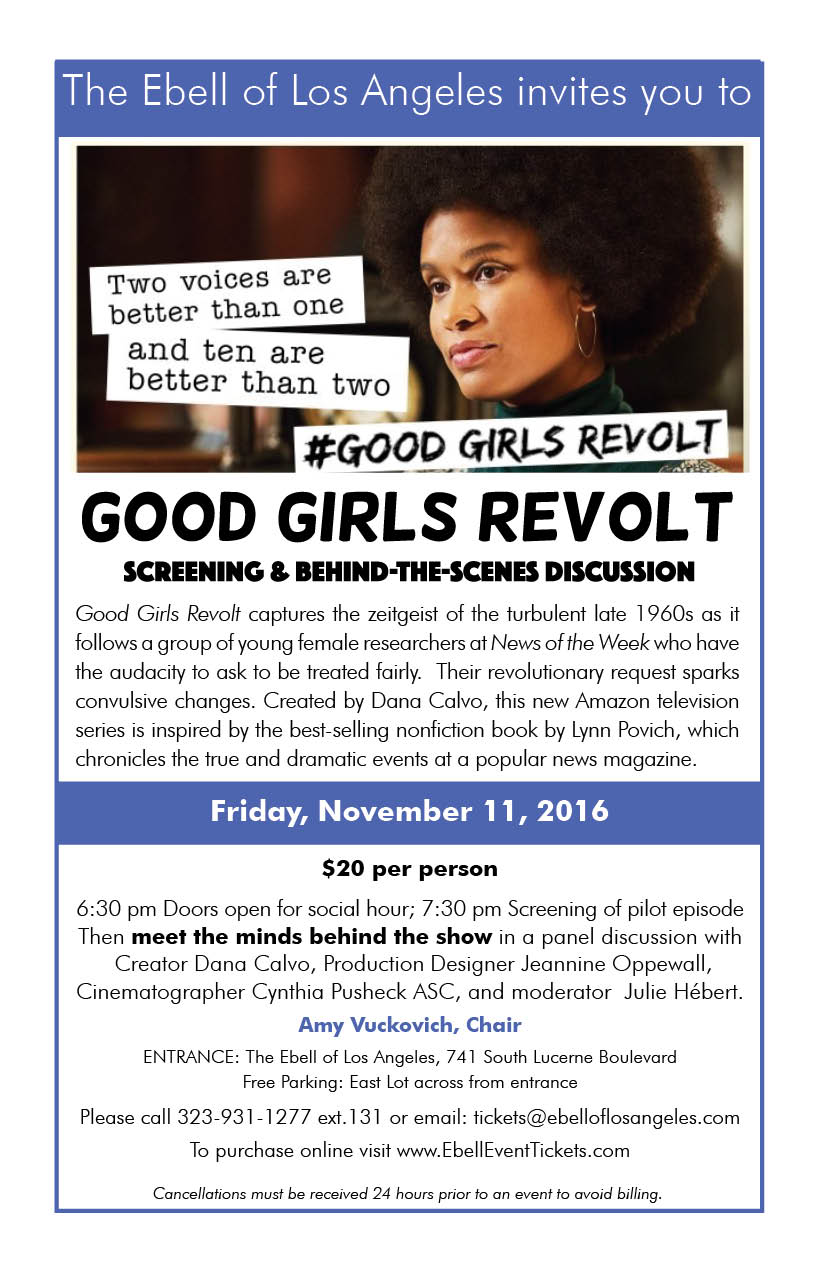
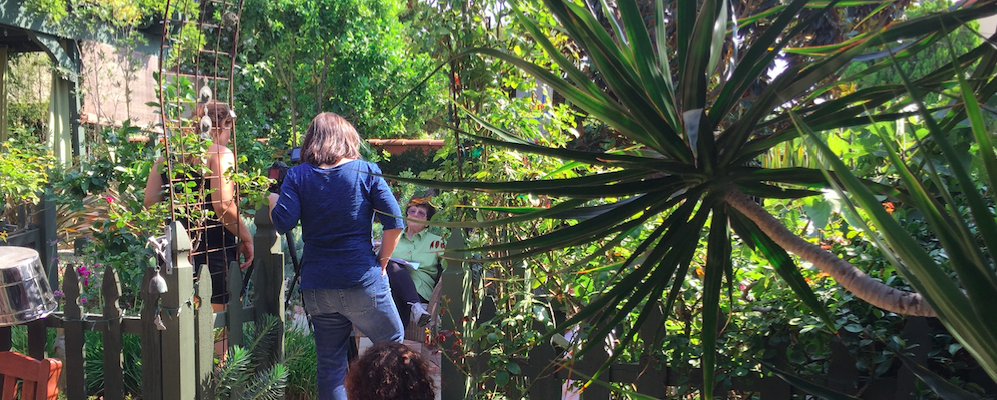
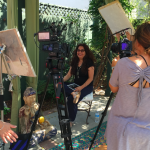
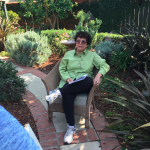
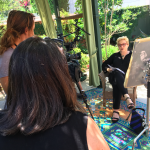
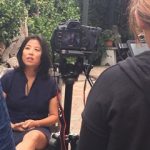
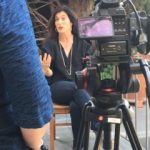
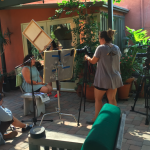
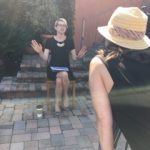
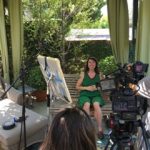
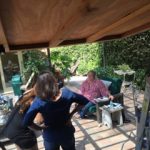
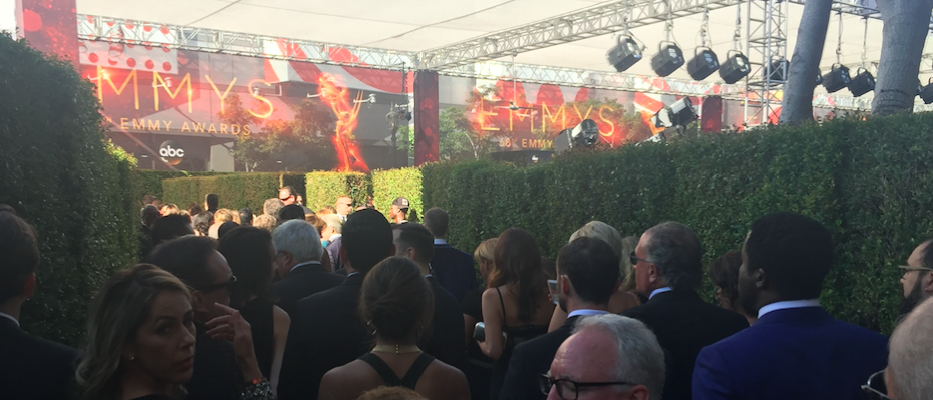
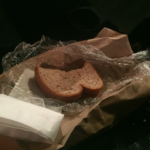
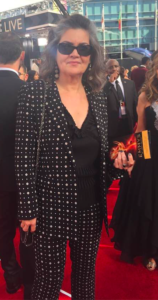 e red carpet was more chill this time, too, despite the 100 degree heat because they’d erected a cover and hedges and had water available and all the folks guiding us along were cheery and helpful. They did a great job of moving thousands of socializing people into place for an on-time start to a live broadcast. Not easy and they did it with grace. I don’t know if it was aired on the Emmy broadcast, but before the show started three kids from Stranger Things sang and danced Uptown Funk and I LOVED it. They were adorable and fun and super-talented. Glad I was in my seat ahead of time to see it.
e red carpet was more chill this time, too, despite the 100 degree heat because they’d erected a cover and hedges and had water available and all the folks guiding us along were cheery and helpful. They did a great job of moving thousands of socializing people into place for an on-time start to a live broadcast. Not easy and they did it with grace. I don’t know if it was aired on the Emmy broadcast, but before the show started three kids from Stranger Things sang and danced Uptown Funk and I LOVED it. They were adorable and fun and super-talented. Glad I was in my seat ahead of time to see it.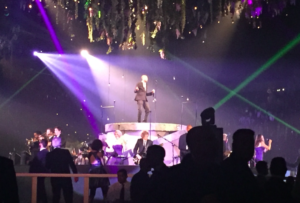 we tromped over to the Governor’s Ball (my feet in stiletto heels were beginning to scream at this point… ah, vanity…) but when we walked in– the decor was breathtaking. Kenn says it’s like the most over-the-top high school prom you can imagine. Last year it felt like we’d been catapulted out into the universe and this year it was more Hobbit-like with lush, draped greenery
we tromped over to the Governor’s Ball (my feet in stiletto heels were beginning to scream at this point… ah, vanity…) but when we walked in– the decor was breathtaking. Kenn says it’s like the most over-the-top high school prom you can imagine. Last year it felt like we’d been catapulted out into the universe and this year it was more Hobbit-like with lush, draped greenery 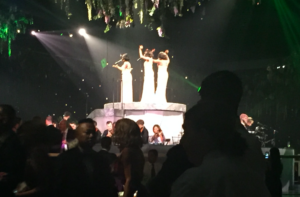
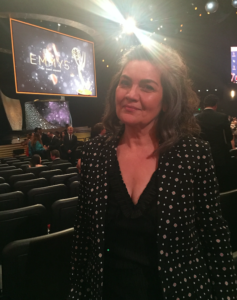 table then wandered around talking to friends and colleagues. Very happy to see some of our brilliant Season Two cast including Joey Pollari, Elvis Nolasco and Connor Jessup, as well as Ms. Cherry Jones, who will be joining us for Season Three. Damn, it’s fun to know amazingly talented people who are all such sweethearts.
table then wandered around talking to friends and colleagues. Very happy to see some of our brilliant Season Two cast including Joey Pollari, Elvis Nolasco and Connor Jessup, as well as Ms. Cherry Jones, who will be joining us for Season Three. Damn, it’s fun to know amazingly talented people who are all such sweethearts.